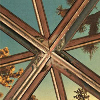
Jefre Cantu-Ledesma's Love Is A Stream was one of my favorite albums from last year, but somehow the fact that his Tarentel bandmate released a great solo album of his own slipped completely under my radar.  Curiously, the two albums could not be more different, as Grady almost completely eschews any hints of the languid post-rock experimentalism of his main gig in favor of more traditional acoustic fare informed by both West African kora music and Eastern-tinged acoustic guitar titans from the '70s folk scene.  Some of it sounds a bit too familiar to make much of an impact on me, but the album's high points are impressive enough to easily eclipse such moments.
Instrumental acoustic guitar albums have always been very difficult for me to connect with on any kind of deep level.  I can certainly appreciate their composition and complexity, but it is pretty rare for me to truly love an acoustic guitar piece.  Grody, to his credit, has managed to bridge the vast gulf between aesthetic appreciation and emotional resonance in at least one case here, "Four Years."  There is no mystery or radical twist to the song, just a great melancholy chord progression combined with a simple, clear, and lushly melodic motif.  Grody simply gets everything exactly right: the harmonies, the pacing, the string scrapes, the texture, etc.  It is an absolutely perfect piece, but it is not an anomaly.  In fact, the languid and beautifully unhurried "Well Wisher" comes close to reaching similar heights, but ends far too soon to accumulate the necessary depth and momentum.  The spare and intimate "Hunted/Haunted" also comes quite close to replicating the magic, unfolding a beautiful progression of minor key arpeggios over a bed of tape hiss.  Curiously, that is the only piece that openly betrays the home-recorded origin of this album.  Too bad– I love tape hiss in this context.
As gifted as Grody is as a steel guitarist, most of Fountain's greatest moments come when he expands his palette a bit to allow room for organs, feedback, and studio-tweaking.  The title piece, for example, benefits greatly from its warm electronic haze and sublime organ accompaniment.  The gentle organ and plucked harmonic reverie "Night Blooms" is also quite beautiful, as is the glistening ambiance of "Covered Mirrors," the one instance where Danny seems to set his acoustic guitar aside entirely.  The album's mesmerizing closer ("Finding Time") again treads quite similar territory, but with stuttering and gently cascading harmonics obscured by its murky, shimmering drones.  For the most part, I think I prefer the more ambient/soundscape side of Danny's work ("Four Years" being an exception) , but the balance between drone works and guitar pieces works quite well here.  The variety suits the album beautiful.
I am actually a bit surprised by how much I like this album, as at least half of these songs are excellent.  In general, I am more drawn to work with a very distinctive or unique aesthetic than Grody exhibits here (though it is also nice when someone is just extremely good at what they do).  I don't mean to imply that Danny is derivative or lacking his own niche, but the more exotic and experimental aspects of his work (while present) are quite secondary to Fountain's success.  Sure, it is pretty neat that Danny artfully uses harmonics to mimic the chiming timbre of African harp music, but it is far more remarkable how intuitively skilled he is at crafting strong melodies and immersive soundscapes and how he avoids ruining his great ideas with clutter or overproduction.  He is simply very gifted at all of the traditional stuff that truly matters: intelligent arranging, compelling dynamics, great use of space, maintaining an unwaveringly "human" feel, etc. As a result, he has created a very warm, intimate, and organic album that has completely won me over.
Samples:
 
Read More

